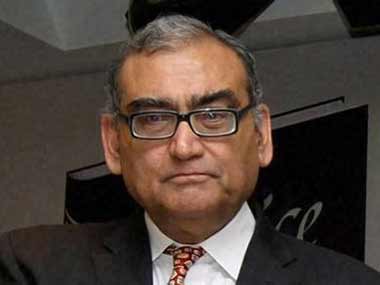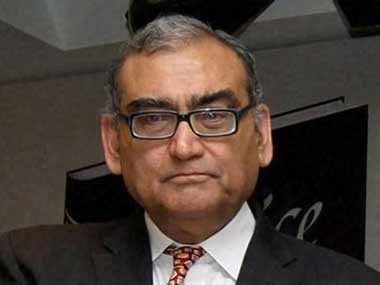In his latest missive, the only saving grace is that Justice Katju is not pontificating on subjects and issues removed from his responsibility as chairman of the Press Council. This time, he focuses on journalism and, in a bizarre opinion, he has formed a team “which is requested to consider all aspects of the matter and submit a report to me at an early date suggesting the qualifications a person should have before he can be allowed to enter the profession of journalism.” What is the definition of journalist? That’s the first thing one needs to understand. “A person who writes for newspapers or magazines or prepares news to be broadcast on radio or television,”
is the most common definition
. By this definition, Justice Katju, who frequently writes in some newspapers, is a journalist as well. Has a done a course in journalism? Er, no, in which case he oughtn’t to be allowed to write, I guess. No, he can, because he has given himself some wriggle room. “For quite some time, therefore, it has been felt that there must be some legal qualification before one can enter the profession of journalism,” he says in his press note. This sentence is cloaked in majestic ambiguity and convenience. “For quite some time,” it begins. From when, Justice Katju? “It has been felt that there must be some legal qualification before one can enter the profession of journalism,” he says. “It has been felt” by whom? Where is this recorded? “There must be some legal qualification” he says. Why? Why only legal in addition to journalism? Why not say that only those who have qualified in journalism should work as journalists? Is it because you want to ensure that you, yourself, qualify? [caption id=“attachment_657382” align=“alignleft” width=“380”]
 PTI[/caption] What about the math, Justice Katju? There are over
86,000 registered newspapers
in India. If each of them needed a minimum of 10 ‘qualified’ journalists, that would mean one needed 8,60,000 Indians with qualifications in journalism. Have you bothered to look at the supply side? The total capacity of all the institutions with specialized courses in journalism would be, I imagine, in the low thousands (take a look at a list of the ‘top’ schools in India
here
). Then we come to definitions. Is a columnist a journalist? If not, we would no longer see, for example, columns by Gurcharan Das or Santosh Desai or Shiv Vishwanathan. Our loss. We would see no guest columns by captains of industry or by politicians. Our loss, again. Sunil Gavaskar would be banned from writing. Too bad. One could go on and on, but it’s not worth the trouble. Justice Katju continues to preoccupy himself with his thoughtless thoughts, and, this time, he is spending the taxpayers’ money to indulge in his whims and fancies, setting up a three-member committee to look into the issue. They could save themselves considerable time and money by googling the question, as I did.
Here’s what the BBC looks for
in a journalist. “A university degree is not required. Many of the BBC’s top journalists didn’t have a university education. You might have other experience or qualifications which are regarded as just as useful or important. The BBC is interested in personal qualities as well as educational achievements. It puts a high value on a proven commitment to a career in journalism and on qualities like energy, enthusiasm, flair, imagination, passion, analytical skills, intellectual curiosity and a reluctance to accept things at face value. You certainly need to be literate and numerate, to be able swiftly to read into and absorb issues and arguments. Having said that, most BBC journalists are graduates, which suggests that a degree gives you a definite advantage. And of course a degree is concrete evidence of intellectual discipline. Many people considering journalism as a career wonder whether they should choose a degree in media studies, journalism or English rather than other subjects. It’s fair to say that many senior journalists are suspicious of media studies courses, and doubt their relevance and value to a career in news. They look much more favourably on journalism courses, which are more news focused. But your degree need not have any obvious connections to a career in journalism. It’s better to study a subject you like and feel passionate about.” But that’s just the BBC, not Justice Katju. Now it’s up to his committee to decide. I hope the committee reaches a conclusion that only those with qualifications in journalism can write. If this happens, Justice Katju will be debarred, and many like me will be spared the suffering caused by his writing. Here’s the press release that Justice Katju had uploaded on his blog:
PTI[/caption] What about the math, Justice Katju? There are over
86,000 registered newspapers
in India. If each of them needed a minimum of 10 ‘qualified’ journalists, that would mean one needed 8,60,000 Indians with qualifications in journalism. Have you bothered to look at the supply side? The total capacity of all the institutions with specialized courses in journalism would be, I imagine, in the low thousands (take a look at a list of the ‘top’ schools in India
here
). Then we come to definitions. Is a columnist a journalist? If not, we would no longer see, for example, columns by Gurcharan Das or Santosh Desai or Shiv Vishwanathan. Our loss. We would see no guest columns by captains of industry or by politicians. Our loss, again. Sunil Gavaskar would be banned from writing. Too bad. One could go on and on, but it’s not worth the trouble. Justice Katju continues to preoccupy himself with his thoughtless thoughts, and, this time, he is spending the taxpayers’ money to indulge in his whims and fancies, setting up a three-member committee to look into the issue. They could save themselves considerable time and money by googling the question, as I did.
Here’s what the BBC looks for
in a journalist. “A university degree is not required. Many of the BBC’s top journalists didn’t have a university education. You might have other experience or qualifications which are regarded as just as useful or important. The BBC is interested in personal qualities as well as educational achievements. It puts a high value on a proven commitment to a career in journalism and on qualities like energy, enthusiasm, flair, imagination, passion, analytical skills, intellectual curiosity and a reluctance to accept things at face value. You certainly need to be literate and numerate, to be able swiftly to read into and absorb issues and arguments. Having said that, most BBC journalists are graduates, which suggests that a degree gives you a definite advantage. And of course a degree is concrete evidence of intellectual discipline. Many people considering journalism as a career wonder whether they should choose a degree in media studies, journalism or English rather than other subjects. It’s fair to say that many senior journalists are suspicious of media studies courses, and doubt their relevance and value to a career in news. They look much more favourably on journalism courses, which are more news focused. But your degree need not have any obvious connections to a career in journalism. It’s better to study a subject you like and feel passionate about.” But that’s just the BBC, not Justice Katju. Now it’s up to his committee to decide. I hope the committee reaches a conclusion that only those with qualifications in journalism can write. If this happens, Justice Katju will be debarred, and many like me will be spared the suffering caused by his writing. Here’s the press release that Justice Katju had uploaded on his blog:
Press release of Press Council of India by firstpost
Anant Rangaswami was, until recently, the editor of Campaign India magazine, of which Anant was also the founding editor. Campaign India is now arguably India's most respected publication in the advertising and media space. Anant has over 20 years experience in media and advertising. He began in Madras, for STAR TV, moving on as Regional Manager, South for Sony’s SET and finally as Chief Manager at BCCL’s Times Television and Times FM. He then moved to advertising, rising to the post of Associate Vice President at TBWA India. Anant then made the leap into journalism, taking over as editor of what is now Campaign India's competitive publication, Impact. Anant teaches regularly and is a prolific blogger and author of Watching from the sidelines.
)